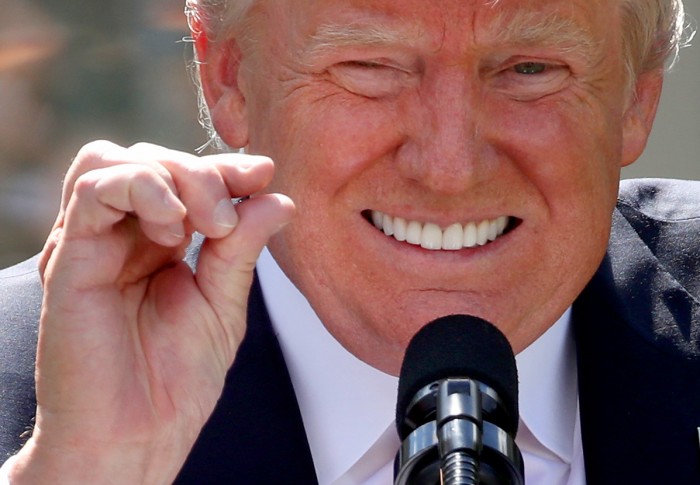Trump Misused MIT Research in Reasons for Ditching Climate Deal

As President Donald Trump explained his rationale for withdrawing from the Paris climate agreement on Thursday, he cited research that seemed to suggest the global emissions cuts agreed to under the deal wouldn’t make a significant difference in worldwide temperatures.
“It is estimated it would only produce a two-tenths of one degree … Celsius reduction in global temperature by the year 2100,” he said, during a press conference in the White House Rose Garden. “Tiny, tiny amount.”
But that’s not actually what the relevant research found, or what the scientists in question concluded.
Trump didn’t name the source of that figure during his press conference, in which he announced the United States would withdraw from the landmark agreement to lower worldwide greenhouse-gas emissions. But Reuters reported that White House documents cited a 2016 study produced by the MIT Joint Program on the Science and Policy of Global Change, titled “How much of a difference will the Paris Agreement make?”
In fact, the “two-tenths of one degree” figure seems to have come from an earlier study by the same group conducted in 2014, before the Paris deal was finalized the following year. It assessed the incremental impact of the accord on top of the earlier Copenhagen agreement. It also didn’t include all the eventual commitments to cut emissions by participating nations, or assume any continuation of those pledges beyond 2030, says Erwan Monier, coauthor of the study and principal research scientist at MIT’s department of Earth, Atmospheric, and Planetary Sciences.
It appears, he says, that the White House cherry picked the lowest number they could find among studies that explored the impact of the climate accord.
The temperate reduction range in the 2016 study — which incorporated all the pledges made by nations participating in the agreement, and assumes they'll be extended or strengthened beyond 2030 — is actually between 0.6 and 1.1 °C. Just two degrees of warming above preindustrial conditions is considered a dangerous level of climate change, so scientists would consider more than half that amount to be a meaningful temperature reduction.
Additionally, the researchers came nowhere close to concluding from their findings that the Paris deal was not worth doing. In MIT News's write up of the study, Monier was quoted as saying, “The Paris agreement is certainly a step in the right direction, but it is only a step.”
Speaking with MIT Technology Review on Thursday, he added, “This idea that the Paris agreement has a negligible impact on future climate change is certainly not what we conveyed and was not the conclusion of our analysis. We make clear that if we want to limit warming to 2 °C, we need to do more and we need continued effort past 2030.”
Monier said that no one from the Trump administration contacted the group to provide an opportunity to discuss or explain their findings.
"The relevant MIT researchers believe that the Paris Agreement is an unprecedented and vital effort by nearly 200 countries to respond to the urgent threat of global climate change," MIT said in a statement on Friday.
The projected temperature reduction was just one of many misleading or misunderstood data points that Trump cited in justifying his decision on Thursday, notably including a disputed economic report commissioned by business groups, as many other publications were quick to report.
Editor’s note: This story was updated to clarify that the initial temperature reduction figure only assessed the incremental impact of the Paris accord on top of the earlier Copenhagen agreement. It also includes additional information about the 2016 study.
Keep Reading
Most Popular
Large language models can do jaw-dropping things. But nobody knows exactly why.
And that's a problem. Figuring it out is one of the biggest scientific puzzles of our time and a crucial step towards controlling more powerful future models.
How scientists traced a mysterious covid case back to six toilets
When wastewater surveillance turns into a hunt for a single infected individual, the ethics get tricky.
The problem with plug-in hybrids? Their drivers.
Plug-in hybrids are often sold as a transition to EVs, but new data from Europe shows we’re still underestimating the emissions they produce.
Stay connected
Get the latest updates from
MIT Technology Review
Discover special offers, top stories, upcoming events, and more.